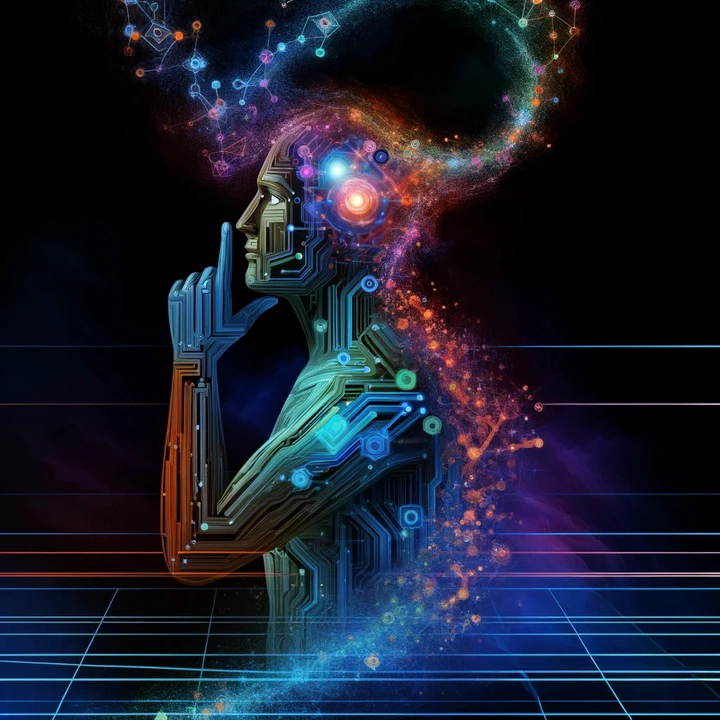I want AI to be my AMI
I want an AI friend, not some super-human AI assistant

The discourse around artificial intelligence often gravitates towards the specter of Artificial General Intelligence (AGI) — a future where machines exhibit human-like understanding and autonomy. Yet, the question that emerges from the shadows of these discussions is not about the inevitability of AGI, but rather, whether it’s truly what we desire. As a researcher,I lean towards a more immediate and personal form of assistance—a partner for brainstorming, not to replace me, but to augment my intellectual endeavors. I want an AI friend, un ami, something that Augments my Intelligence (AMI), not some super-human AI assistant.
The current landscape of AI, particularly with the advent of generative models like Large Language Models (LLMs), opens up new avenues for augmenting our intellectual endeavors. Unlike AI Code assistants that focus on specific coding related tasks, LLMs offer a broader spectrum of assistance, from enhancing productivity to acting as catalysts for creativity.Imagine an entity that not only assists with the minutiae of daily tasks but also serves as a partner in brainstorming, a conduit for the flow of ideas.
Beyond Hallucinations
These tools are not without their flaws. Generative LLMs, for instance, have been criticized for their tendency to “hallucinate” — to generate content that, while creative, may not be anchored in fact. This, I believe, is a feature not a bug. We can appreciate these “hallucinations” as a source of inspiration; instead of dismissing them outright, we can view them as a wellspring of ideas, pushing us towards connections and insights that might have otherwise eluded us.
Terry Tao echoes my thinking. In his short essay on how we should be ready to reset our expectations with AI, he mentions
The stylistic signals that I traditionally rely on to “smell out” a hopelessly incorrect math argument are of little use with LLM-generated mathematics. Only line-by-line reading can discern if there is any substance. Strangely, even nonsensical LLM-generated math often references relevant concepts. With effort, human experts can modify ideas that do not work as presented into a correct and original argument. The 2023-level AI can already generate suggestive hints and promising leads to a working mathematician and participate actively in the decision-making process.
In other words, LLMs provide a unique lens through which ideas can be explored and connections unearthed, which might otherwise remain hidden.
Clarifying thought processes
In my daily routine, LLMs have become indispensable in refining my thinking. The act of articulating thoughts and engaging with an LLM forces a level of clarity and self-scrutiny that is immensely valuable. By challenging assumptions and posing critical questions, these interactions foster a deeper level of intellectual engagement.
The true promise of LLMs is in tools such as FigJam. I use FigJam liberally at work to storyboard, brainstorm, and as a useful method for organizing my thoughts. FigJam includes an LLM assistance that fits neatlu within my workflows. I can use the platform to organize ideas, generate summaries, and propose new presentation method. FigJam has taken the concept of a whiteboard and transformed it into a dynamic, AI-assisted space for collaboration. It also serves as a non-Chatbot way to interact with AI, which is a refreshing change from the usual conversational interfaces
All of this has fundamentally changed how I work. Such applications highlight the essence of AMI - AI as a friend and collaborator that enhances rather than supplants my intelligence.
Were the Luddites right?
This vision of AI, as a friend rather than a foe, aligns with a broader critique of the technophobic narrative that often accompanies discussions of AI. The invocation of the Luddites, historically misrepresented as anti-technology, serves as a cautionary tale. Their resistance was not to technology per se, but to the dehumanizing use of it — a sentiment echoed in contemporary debates around AI.
Lest I be misunderstood, I am not advocating for all of us rising up and smashing our computers. Rather, I am saying that current generative AIs are a tool that, when wielded with intention and care, can amplify our intellectual capabilities, making us not less human, but more profoundly so. I leave Prof Tao with the last word:
Our usual technology paradigms will not serve as an adequate guide for navigating these uncharted waters. Perhaps the greatest challenge will be transitioning to a new AI-assisted world as safely, wisely, and equitably as possible.